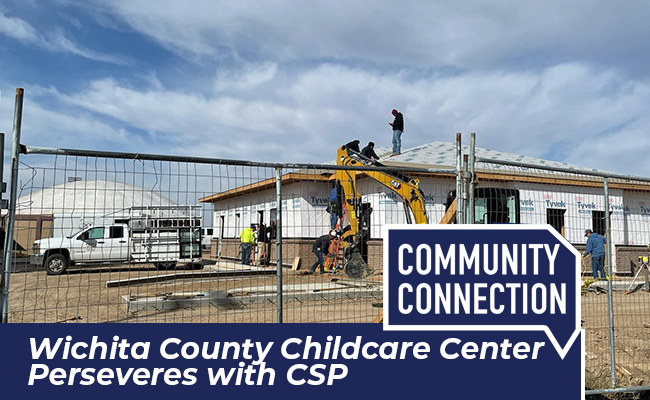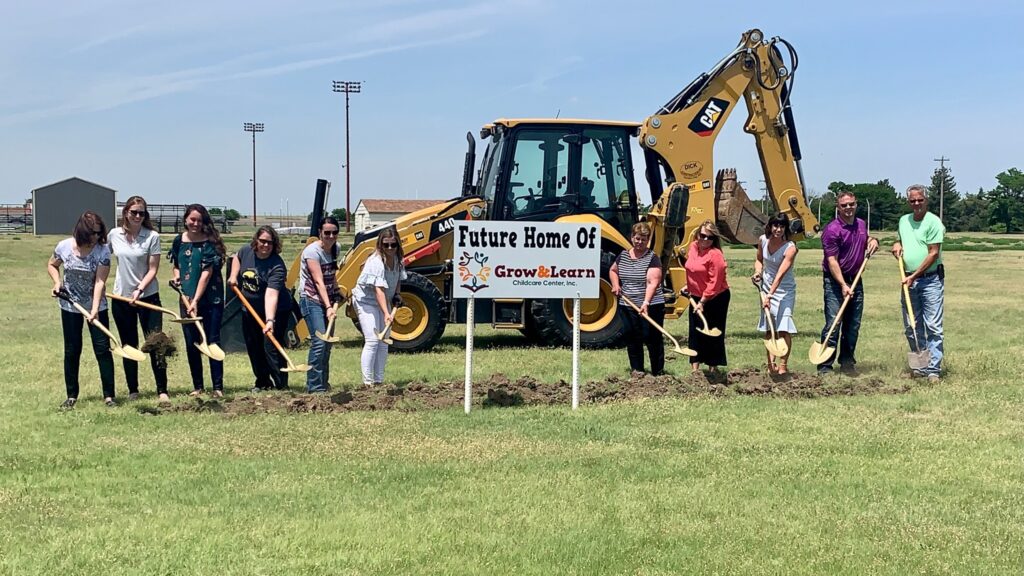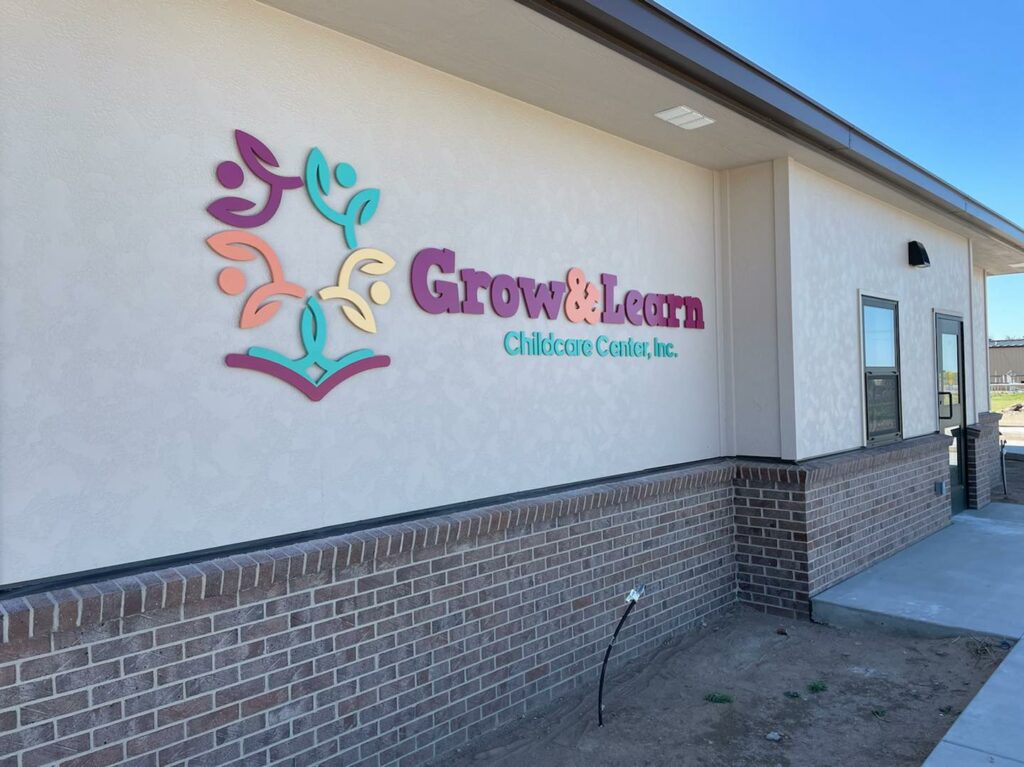Aug 14, 2022

Having the backbone and grit to overcome any no is a Wild West mentality, to be sure. For Wichita County, a frontier county in western Kansas, it is as necessary today as it was in the 1800s. The county is home to 2,100 people who rely on hard work and compassion for their neighbors. Recently, the severe lack of accessible, affordable and quality childcare in the region has caused a dramatic economic crisis. For families with children under the age of two, there are no childcare options in the county. Even for families with older children, options are limited to a single licensed facility. This lone facility meets less than 10% of the county’s childcare needs.
Leoti has lost eight daycare homes in the past 10 years, or 67 slots for children. Parents are forced to adjust work hours, turn to retired family members or quit their jobs entirely to ensure care for their small children. The three largest employers, the school district, the hospital and the county, struggle with recruitment because the community cannot provide childcare, a critical and basic support for all working parents.
The Wichita County Economic Development (WCED) organization, led by Executive Director Nikki Bjurstrom and Board Treasurer Jenny Long, spent a year researching solutions. They discovered an estimated shortage of 84 slots for children five and under. It also projected that 67 adults would join the workforce if they were able to place their child in quality care, resulting in an additional $1,816,000 in personal income annually. According to a 2019 Child Care Aware report, Wichita County falls in the bottom three counties in Kansas, when it comes to childcare and they are 1 of 18 counties with zero openings for infants and toddlers. Through town hall meetings, surveys and the recruitment of outside analysts the vision for the Grow & Learn Childcare Center (GLCC) came alive.
When asked what her role in the project was, Jenny responded with “just a volunteer.” Nikki, on the other hand, described Jenny’s role as “project champion” and reminded her she also serves on the board. Jenny agreed but added it’s not because of her title that she’s involved in the childcare center.
“My husband and I own a business here in Leoti. I don’t get compensated for this, I work from home,” Jenny said. “I’ve worked on this project for four years just because I want Leoti to be here for my kids when I’m older, when they’re older.”
Jenny Long


“My husband and I own a business here in Leoti. I don’t get compensated for this, I work from home,” Jenny said. “I’ve worked on this project for four years just because I want Leoti to be here for my kids when I’m older, when they’re older.” Although Jenny has children, she will not be one of the people to utilize the childcare services, and she is not alone. Every volunteer on the project selflessly gave their time, not needing the services they are creating, simply wanting to meet a need in their community. The GLCC will provide quality, affordable care that meets the needs of each child and family in a nurturing, safe and educational environment. When finished, the 3,500-square-foot facility will accommodate seven staff and up to 40 children from infant to five years. At capacity, the center will meet 45% of the overall childcare demand in Wichita County. The goal is to open on August 1, right before the start of school. A partnership with USD 467 allowed the facility to be built on school grounds. The public-private partnership also means the shared use of the school storm shelter, meal preparation and groundskeeping.
Partnerships were of course only one part of the process. GLCC needed financial backing. Both Nikki and Jenny agreed the catalyst for fundraising was the Community Service Tax Credit Program (CSP).
“Without the tax credit program, this project probably would have died,” Jenny said. “It was the first award we received. We got them in July and we sold all of them by December. So in six months, we sold them and that really turned a lot of eyes in our community and they started believing in our project. It moved the needle.”
Nikki believes the tax credits were the difference in some giving $5,000 versus $50. The program not only created the desire for individuals and businesses to provide significantly more, but it also made people believe in the efforts.
“(Selling the tax credits) helped us to collect that list of people who were standing behind us, which feels really good and helps you push through and keep going,” Nikki said.
The success of tax credits also allowed WCED to secure additional funding sources. For organizations to even apply for the Mabee Foundation Grant, the project must have raised 40% of the overall project cost. CSP put the childcare center well over that mark and when the WCED applied, they were awarded that grant. They also secured a Kansas Community Investment Fund Loan, Rural Economic Development Loan through Wheatland Electric, Kansas Children’s Cabinet grant, and more. The final price tag of GLCC will be $1.3 million – 30% over their initial estimates, which they blame on the Covid pandemic.
Challenges to the project changed throughout the process. Fundraising and Covid were certainly on that list, but so was community support. Now, almost at the finish line, Nikki feels there are still people today who believe the GLCC will fail. The current concern is staffing the center. To serve the maximum number of children, the center requires seven staff with training for under-school-aged children. With no infant and toddler care services currently available, not many residents have this training. Like many Kansas counties, Wichita County has an employment rate of less than 2% and over 100 available jobs. WCED knows it will have to get creative to solve the issue and is already talking about how to “grow their own people” starting at the middle school and high school levels.
So now that the center is nearing completion, what advice would Nikki and Jenny give? Don’t try to do a project like this alone. Find your community champions, and don’t start it unless the people behind it are really willing to “stick it through.” There were many opportunities to say no to this project, to let the challenges and the naysayers overcome the mission, but that’s just not an option in Wichita County. They also encourage communities to be patient. Projects can’t happen overnight. It takes a year of planning and research, a year of fundraising, and at least a year to build, longer if a pandemic is involved.
Would they do it all again and would they tell others to chase a project like this? Absolutely.
If your community is interested in improving their ability to undertake major capital campaigns for projects involving children and family services, non-governmental crime prevention, youth apprenticeship, and youth technical training and healthcare by utilizing tax credits, please reach out to Community Development Specialist, Sara Bloom ([email protected] or 785-506-9278) or visit our website at Kansascommerce.gov/Community.